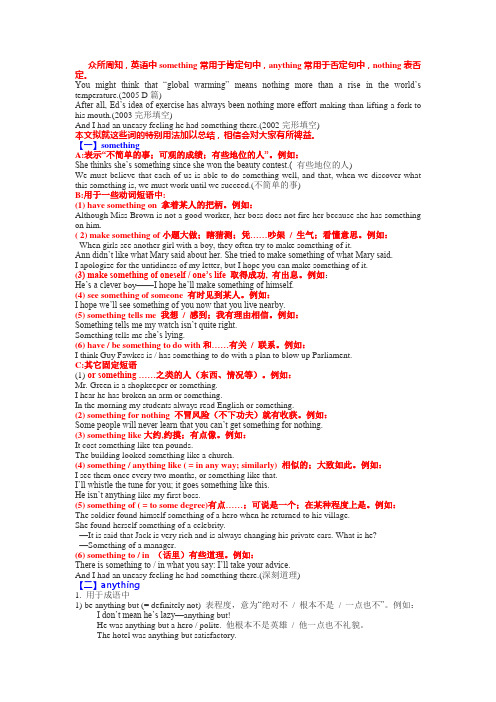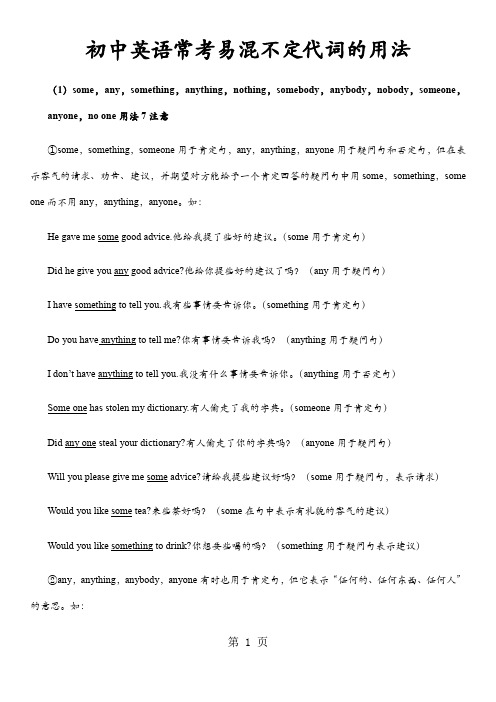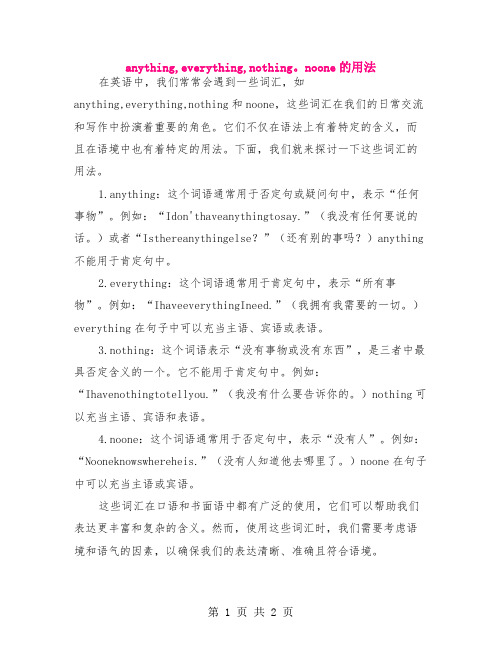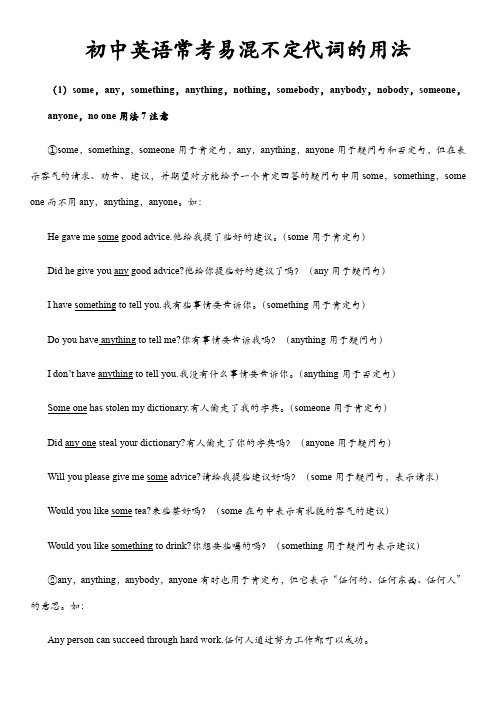something anything nothing的用法详解
something, nothing,anything

The thief ran
4) or anything 或是其他别的事
when he saw the policeman.
, I'll be here all day.
If Tiger wants to call me
The news is / means nothing to him.
(话里)有些道理
or something ……之类的人/物等) 11. In the morning my students always read English or something. 12. Mr. Green is a shopkeeper or something. 13. I hear he has broken an arm or something. something like大约,约摸/有点像 14. It cost something like ten pounds. 15.The building looked something like a church. something/anything like (=in any way/similarly) 相似的/大致如此。 16. I see them once every two months, or something like that. 17. He isn‘t anything like my first boss. something of (=to some degree) 有点…/可说是一个/在某种程度上是。 18. The soldier found himself something of a hero when he returned to his village.
不定代词用法总结

不定代词用法总结不定代词是在句子中代替特定人或物的词语,它们的使用能够让句子更加简洁明了。
下面是对不定代词的用法做一个总结。
1. 一般不定代词一般不定代词包括"something"、"anything"、"nothing"、"everything"等,它们用来代替不具体指向的事物。
例如:- I have something to tell you.- Is there anything I can do for you?- Don't worry, it's nothing serious.- She knows everything about that topic.2. 不定代词"some"和"any""some"和"any"可以用作不定代词,也可以用作不定代词,具体使用要根据句子的语境来确定。
当"some"用作不定代词时,表示肯定或推测的意思。
例如:- There are some books on the table.- Can I have some water, please?当"any"用作不定代词时,表示否定或疑问的意思。
- I don't have any money with me.- Do you have any ideas for the project?3. 不定代词"somebody"、"anybody"、"nobody"和"everybody"这些不定代词用来代替人。
它们的使用方式类似于前面提到的一般不定代词。
例如:- Somebody is waiting for you outside.- Nobody knows the answer.- Can anybody help me with this problem?- Everybody enjoyed the party.4. 不定代词"each"和"every""each"和"every"用来代替三者或多者中的每一个。
something、anything和nothing特殊用法

众所周知,英语中something常用于肯定句中,anything常用于否定句中,nothing表否定。
You might think that “global warming” means nothing more than a rise in the world’s temperature.(2005 D篇)After all, Ed’s idea of exercise has always been nothing more effort-making than lifting a fork to his mouth.(2003完形填空)And I had an uneasy feeling he had something there.(2002完形填空)本文拟就这些词的特别用法加以总结,相信会对大家有所裨益。
【一】somethingA:表示“不简单的事;可观的成绩;有些地位的人”。
例如:She thinks she’s something since she won the beauty contest.( 有些地位的人)We must believe that each of us is able to do something well, and that, when we discover what this something is, we must work until we succeed.(不简单的事)B:用于一些动词短语中:(1) have something on 拿着某人的把柄。
例如:Although Miss Brown is not a good worker, her boss does not fire her because she has something on him.( 2) make something of小题大做;瞎猜测;凭……吵架/ 生气;看懂意思。
英语中形容词的用法

2) 表示三者或三者以上(人或事物)的 比较用最高级,最高级的前面一般要加
定冠词the,后面可带of(in,among)
短语来说明比较的范围
*Shanghai is the biggest city in China.
*Lucy sings (the) best of all.
*He is the most careful among us.
5)几种比较级的使用句型 1.“ 比较级 + and + 比较级 ” 表示“ 越来越······”
*Your English is getting better and better. 你的英语越来越好了。 *These days more and more people are learning English. 现在学英语的人越来越多了。
3) 在表示 “和······一样······” 和 “不及······” 这类概念时,可以用 “as+原级+as” 和 “not as(so) +原级+as”的句型
*Our teacher is as busy as before.
*He does not run so (as) fast as 用来修饰名词或代词, 表示人或 事物的性质, 状态,和特征。
二、形容词的用法:
1. 作定语,一般放在名词之前, 不定 代词 something,anything,nothing, everything 等之后。
eg. It’s a sunny day today.
今天是个阳光灿烂的日子。
电影里有什么有趣的内容吗?
There is nothing dangerous here. 这儿一点都不危险。
something,anything, everything

everything, something, anything , nothing 均为指物的复合不定代词,它们作主语时,谓语动词常用单数形式everything 意为每件事;一切事,可用于肯定句、疑问句或否定句中。
如:①I hope everything goes well. 我希望一切顺利。
②Who can know everything? 谁能知道万事万物呢?something意为某事;某物,常用于肯定句中,也可用于征求对方意见的疑问句中。
如:①Something is wrong with my ears. 我的耳朵有点毛病。
②Jim, could you do something for me, please? 吉姆,请为我做点事好吗?anything 意为某事一些事,一般用于否定句或疑问句中。
如:①Can you hear anything? 你能听到某种声音吗?②You mustn't eat anything until you see the doctor. 在看医生之前不许吃任何东西。
意为任何事用于肯定句中。
如:You can ask me anything you want to know.nothing意为没有什么;没有东西。
如:Tom saw nothing. 汤姆什么也没看见nothing=not anythingeverything 最重要的. Money is everything to him.金钱对他比什么都重要。
A somethingB anythingC nothingD everything1 I want to do __________.我想做点什么事。
2 There is _________ in the box.盒子里有一些东西。
3 There isn’t _____________ in the box.4 Is there ____________ in the box?5 Are you doing ___________?6 I had ____________ to do.我没有事情做。
初中英语常考易混不定代词的用法

初中英语常考易混不定代词的用法(1)some,any,something,anything,nothing,somebody,anybody,nobody,someone,anyone,no one用法7注意①some,something,someone用于肯定句,any,anything,anyone用于疑问句和否定句,但在表示客气的请求、劝告、建议,并期望对方能给予一个肯定回答的疑问句中用some,something,some one而不用any,anything,anyone。
如:He gave me some good advice.他给我提了些好的建议。
(some用于肯定句)Did he give you any good advice?他给你提些好的建议了吗?(any用于疑问句)I have something to tell you.我有些事情要告诉你。
(something用于肯定句)Do you have anything to tell me?你有事情要告诉我吗?(anything用于疑问句)I don’t have anything to tell you.我没有什么事情要告诉你。
(anything用于否定句)Some one has stolen my dictionary.有人偷走了我的字典。
(someone用于肯定句)Did any one steal your dictionary?有人偷走了你的字典吗?(anyone用于疑问句)Will you please give me some advice?请给我提些建议好吗?(some用于疑问句,表示请求)Would you like some tea?来些茶好吗?(some在句中表示有礼貌的客气的建议)Would you like something to drink?你想要些喝的吗?(something用于疑问句表示建议)②any,anything,anybody,anyone有时也用于肯定句,但它表示“任何的、任何东西、任何人”的意思。
不定代词somethinganything及nothing特殊用法归纳

不定代词somethinganything及nothing特殊用法归纳不定代词something、anything及nothing特殊用法归纳不定代词是英语语法中的重要部分,它们可以代替实际的人、物或情况,使句子更加简洁和灵活。
其中,something、anything及nothing 是常见的不定代词,在不同的语境中具有特殊的用法。
本文将对这三个不定代词的特殊用法进行归纳和总结。
一、something的特殊用法1. 表示肯定意义的某事物或某情况something用于肯定句,表示某事物或某情况,通常用来指代特定的事物或情况,但是具体的事物或情况并不明确。
例句:- I need something to drink.(我需要喝点什么东西。
)- She said something funny.(她说了一些有趣的事情。
)2. 表示建议或提议something还可以用于表示建议或提议,表示“有什么事物可以做”,常用于疑问句或条件句中。
例句:- Why don't we do something different this weekend?(这个周末我们为什么不做点不同的事情呢?)- If you have something to say, please speak up.(如果你有什么话要说,请大声说出来。
)3. 表示程度在某些句型中,something可以用来加强程度,表示“非常”或“相当”。
例句:- She is something of a genius.(她有些天才。
)- The movie was something amazing.(这部电影相当精彩。
)二、anything的特殊用法1. 表示否定意义的任何事物或任何情况anything用于否定句,表示任何事物或任何情况,强调没有限制和选择的范围。
例句:- I don't want anything to eat.(我什么都不想吃。
anything,everything,nothing。no one的用法

anything,everything,nothing。
noone的用法在英语中,我们常常会遇到一些词汇,如anything,everything,nothing和noone,这些词汇在我们的日常交流和写作中扮演着重要的角色。
它们不仅在语法上有着特定的含义,而且在语境中也有着特定的用法。
下面,我们就来探讨一下这些词汇的用法。
1.anything:这个词语通常用于否定句或疑问句中,表示“任何事物”。
例如:“Idon'thaveanythingtosay.”(我没有任何要说的话。
)或者“Isthereany thingelse?”(还有别的事吗?)anything不能用于肯定句中。
2.everything:这个词语通常用于肯定句中,表示“所有事物”。
例如:“IhaveeverythingIneed.”(我拥有我需要的一切。
)everything在句子中可以充当主语、宾语或表语。
3.nothing:这个词语表示“没有事物或没有东西”,是三者中最具否定含义的一个。
它不能用于肯定句中。
例如:“Ihavenothingtotellyou.”(我没有什么要告诉你的。
)nothing可以充当主语、宾语和表语。
4.noone:这个词语通常用于否定句中,表示“没有人”。
例如:“Nooneknowswhereheis.”(没有人知道他去哪里了。
)noone在句子中可以充当主语或宾语。
这些词汇在口语和书面语中都有广泛的使用,它们可以帮助我们表达更丰富和复杂的含义。
然而,使用这些词汇时,我们需要考虑语境和语气的因素,以确保我们的表达清晰、准确且符合语境。
总的来说,这些词汇的使用取决于我们的语境和目的。
我们需要根据具体的情境选择合适的词汇,以确保我们的表达能够准确地传达我们的意思。
无论是在口语还是书面语中,我们都应该尽可能地使用精确的词汇,以提高我们表达的清晰度和准确性。
something anything nothing 用法

something anything nothing 用法Something Anything Nothing 用法Something, anything, 和 nothing 是英语中常用的三个单词,它们在不同的语境中有着不同的意思和用法。
下面将详细介绍这三个单词的用法。
一、Something 的用法1. Something 作为代词时,表示“某事物”,通常与不定冠词 a 或an 连用。
例如:- I want to buy something to eat.- Do you have something to drink?2. Something 还可以表示“某种程度”,通常与形容词或副词连用。
例如:- He felt something better after taking the medicine.- She was something surprised by the news.3. Something 还可以表示“某种程度的肯定”,通常与 too 连用。
例如:- The movie was something too long for my taste.- The food was something too spicy for me.4. Something 还可以表示“某种程度的否定”,通常与 not 连用。
例如:- The book was something not what I expected.- The weather was something not so good yesterday.二、Anything 的用法1. Anything 作为代词时,表示“任何事物”,通常与否定形式连用。
例如:- I don't want anything to eat.- He didn't say anything about it.2. Anything 可以表示“任何一件事情”,通常与疑问词连用。
something,anything,someone,none,nobody等等区别

1、something、nothing、nobody、everything等等的区别。
--There is something on the table. 桌子上有什么东西。
--There is not anything on the table. 桌子上没有任何东西。
--We can’t do anything. 我们什么都做不了。
--Did you find anything? 你发现了什么东西吗?--I have no money, no home, no love, I am nothing now. 我现在一无所有。
--There is somebody (someone) in my room. 我房间里有人。
--There isn’t anybody (anyone) in my room. 我房间里没有人。
--He thinks himself somebody. 他以名人自居。
--You can give it to anybody (anyone). 你可以把它给任何人。
--Who is in the room? --Nobody (no one).--How many people in the room? —None.--Nobody(no one) can speak Japanese. 不可说Nobody of them…--None of them can speak Japanese.--Everything is all right. 一切都好。
--Everyone (everybody) went home. 大家都回家了。
2、sometime、sometimes等等的区别。
--I think to have a holiday with my family sometime in next month.--Sometimes I will have a holiday with my family.--I want some time to answer your question.--I met him some times in the street last month.。
复合不定代词的用法总结笔记

复合不定代词的用法总结笔记
复合不定代词是一类特殊的代词,包括something、anything、nothing、who-、whatever、whoever等。
它们通常用于表达不确定的或不特定的概念或情况。
以下是对复合不定代词用法的总结笔记。
1.复合不定代词可以作为主语、宾语或表语。
2.当复合不定代词作为主语时,谓语动词用单数形式。
3.复合不定代词用于肯定句时通常表示某种或某些特定的事物或人,用于疑问句和否定句
时则表示不确定的或不特定的概念或情况。
4.在表达请求或建议时,可以用“Would you like + 复合不定代词?”的结构来询问对方
是否想要某物或是否可以做某事。
5.在表达可能性或推测时,可以用“It is possible/probable/likely + that从句”的
结构来表达。
6.在表达委婉语气时,可以用“It would be better/more convenient/more pleasant +
to do sth”的结构来表达。
7.在表达相反概念时,可以用“nothing but”的结构来表达“只有”的意思。
8.在表达条件时,可以用“anything but + 名词”的结构来表达“除了某事物之外的任
何事物”的意思。
9.在表达让步时,可以用“whoever + 动词”的结构来表达“无论谁”的意思。
10.在表达建议或命令时,可以用“Let’s + 复合不定代词”的结构来表达“让我们做某
事”的意思。
(完整)初中英语常考易混不定代词的用法

初中英语常考易混不定代词的用法(1)some,any,something,anything,nothing,somebody,anybody,nobody,someone,anyone,no one用法7注意①some,something,someone用于肯定句,any,anything,anyone用于疑问句和否定句,但在表示客气的请求、劝告、建议,并期望对方能给予一个肯定回答的疑问句中用some,something,some one而不用any,anything,anyone。
如:He gave me some good advice.他给我提了些好的建议。
(some用于肯定句)Did he give you any good advice?他给你提些好的建议了吗?(any用于疑问句)I have something to tell you.我有些事情要告诉你。
(something用于肯定句)Do you have anything to tell me?你有事情要告诉我吗?(anything用于疑问句)I don’t have anything to tell you.我没有什么事情要告诉你。
(anything用于否定句)Some one has stolen my dictionary.有人偷走了我的字典。
(someone用于肯定句)Did any one steal your dictionary?有人偷走了你的字典吗?(anyone用于疑问句)Will you please give me some advice?请给我提些建议好吗?(some用于疑问句,表示请求)Would you like some tea?来些茶好吗?(some在句中表示有礼貌的客气的建议)Would you like something to drink?你想要些喝的吗?(something用于疑问句表示建议)②any,anything,anybody,anyone有时也用于肯定句,但它表示“任何的、任何东西、任何人”的意思。
辨析everything, something, anything, nothing配套课件

anything
anything意为“某事、某物、任何事物”,一般用于否定句或疑问句中 。如果用于肯定句中,表示“任何事物”。 Can you hear anything? 你能听到某种声音吗? You can do anything if you try! 如果你尝试,你可以做任何事!
nothing
nothing意为“没有什么、没有东西”。 Tom saw nothing. 汤姆什么也没看见。 There is nothing new under the sun. 天下并无奇事。
即时练习
选词填空(everything, something, anything, nothing)。 1. You mustn't eat __a_n_y_th_i_n_g__ until you see the doctor. 2. There is __s_o_m__e_th_i_n_g__ wrong with my computer. 3. How is __e_v_e_r_y_th_i_n_g__ going? 4. __N_o_t_h_in_g__ is impossible if you work hard. 5. I'm hungry, I want _s_o_m__et_h_i_n_g__ to eat.
课堂小结
everything意为“每件事物、一切事物”,用于肯定句、否定句和疑问句 。 something意为“某事、某物”,常用于肯定句中,如果用于疑问句, 表示希望得到对方肯定的回答。 anything意为“某事、某物、任何事物”,一般用于否定句或疑问句中。 如果用于肯定句中,表示“任何事物”。 nothing意为“没有什么、没有东西”。
辨析everything, something, anything, nothing
somethinganything和nothing特殊用法归纳

somethinganything和nothing特殊用法归纳something, anything和nothing特殊用法归纳在英语中,有三个词汇经常被用来表示事物或概念的不同程度,它们分别是something、anything和nothing。
这三个词汇在不同语境下有着特殊的用法和含义。
接下来,我们将对它们的用法进行详细归纳,帮助读者更好地理解和运用这些词汇。
1. somethingsomething 意为“某事物”,用于表示某种未指明的事物或概念。
以下是 something 的常见用法:1.1 表示一个具体的事物或物品:- Would you like something to drink?(你想要点喝的吗?)- She found something interesting in the bookstore.(她在书店发现了一些有趣的东西。
)1.2 表示一些未具体指明的事物或概念:- There's something wrong with the computer.(电脑出毛病了。
)- I need something to wear to the party.(我需要找件参加派对的衣服。
)1.3 在肯定句中表示某种程度的事物或概念:- He achieved something great during his time as a student.(他在学生时代取得了一些伟大的成就。
)- I want to do something meaningful with my life.(我想用我的生活做些有意义的事情。
)2. anythinganything 意为“任何事物”,用于表示无论什么事物,包括否定和疑问句。
以下是 anything 的常见用法:2.1 表示对无所谓的选择或可能性:- You can eat anything you want at the buffet.(自助餐厅里你可以吃任何你想吃的东西。
不定代词的使用和辨析

不定代词的使用和辨析不定代词是指不具体指明代替的人或物的代词,它在句子中起到代替名词或指示词的作用。
它的使用对于句子的连贯性和表达的准确性至关重要。
本文将探讨不定代词的使用和辨析。
一、不定代词的基本概念不定代词是一种特殊的代词,它具有指示、代替和数量表达的功能。
不定代词可以统指不确定的人或物,常用于句子中指代未具体指出的事物。
二、不定代词的分类及用法1. 不定代词的分类(1)不定代词的基本形式:something, anything, nothing, everything 等。
(2)不定代词的否定形式:nobody, no one, none, neither等。
(3)不定代词的指示形式:this, that, these, those等。
2. 不定代词的用法(1)不定代词作主语:Everyone is responsible for their own actions.(每个人对自己的行为负责。
)(2)不定代词作宾语:I want something to eat.(我想要吃点东西。
)(3)不定代词作表语:The problem is nothing.(问题并不存在。
)(4)不定代词作定语:Any book will do.(任何一本书都可以。
)三、常见不定代词的辨析1. somebody, anybody, nobody(1)somebody:某人,用于肯定句,表示未具体指明的人。
(2)anybody:任何人,用于疑问句和否定句,表示任何不确定的人。
(3)nobody:没有人,表示全部人都不。
2. something, anything, nothing(1)something:某事物,用于肯定句,表示未具体指明的事物。
(2)anything:任何事物,用于疑问句和否定句,表示任何不确定的事物。
(3)nothing:没有事物,表示全部事物都没有。
3. somewhere, anywhere, nowhere(1)somewhere:某地,用于肯定句,表示未具体指明的地点。
复合不定代词用法和练习(含答案)

复合不定代词用法和练习(含答案)复合不定代词用法和练复合不定代词的用法:不指明替代某个(些)人、某个(些)事物的代词叫不定代词。
由some-,any-,no-,every-加上-one,-body,-thing连用,构成复合不定代词。
复合不定代词包括something, somebody, someone, anything, anybody, anyone, nothing, nobody, noone, everything, everybody, everyone等十二个。
这些复合代词具有名词性质,在句中可用作主语、宾语或表语,但不能用作定语。
一、复合不定代词的指代对象1、含-body和-one的复合代词只用来指人,含-body的复合不定代词与含-one的复合不定代词在功能和意义上完全相同,可以互换。
只是用-body时显得较通俗些,多用于口语中,用-one时显得较文雅些,更常见于正式场合及书面语中。
如:XXX.有人在隔壁房间哭。
2、含-thing的复合不定代词只用来指事物。
如:Are you going to buy anything?你会去买东西吗?二、复合不定代词的属格1、含-one和-body等指人的复合代词可有-’s属格形式。
如:Everybody’s business is nobody’s business.大家的工作没人管。
Is this XXX’s seat?这儿有人坐吗?2、含-one和-body等指人的复合代词后跟else时,-’s属格应加在else之后。
如:Can you remember someone else’s name?你还记得其他人的姓名吗?3、含-thing等指事物的复合不定代词没有-‘s属格方式。
三、复合不定代词的数1、复合不定代词都具有单数的含义,因此通常被看成是单数第三人称。
当它们充当句子的主语时,其后的谓语动词用单数形式。
如:XXX here today?今天,大家都到齐了吗?XXX difficult if you put your heart into it.世上无难事,只怕有心人。
something anything nothing 用法

something anything nothingIntroductionIn our daily lives, we often come across situations where we have to make choices or decisions. Sometimes, these choices involve something, anything, or nothing. These three words hold significant meaning and can impact our lives in various ways. In this article, we will explore the usage and implications of something, anything, and nothing.SomethingDefinitionSomething refers to a thing that is not specified or named explicitly. It is used to refer to a particular object, action, or idea when the exact details are not known or not important.Examples1.I have something for you. (referring to an unspecified item)2.There is something strange about him. (referring to an unknownquality)3.Let’s do something fun today. (referring to an unspecifiedactivity)Usage•Positive context: Something is often used in positive contexts to express the presence of a desirable or interesting thing orsituation.•Indefinite quantity: Something is used to refer to an indefinite quantity or amount.AnythingDefinitionAnything refers to any object, action, or idea, regardless of its nature or details. It is used when there is no restriction or limitation on the options available.Examples1.You can choose anything from the menu. (referring to any item)2.Is there anything I can do to help? (referring to any action)3.I am willing to try anything once. (referring to any idea orexperience)Usage•Open-ended options: Anything is used when there are no specific limitations or restrictions on the choices available.•Negative context: Anything is often used in negative contexts to imply a lack of restrictions or limitations.NothingDefinitionNothing refers to the absence of anything or the lack of something. It is used to indicate the absence of a particular object, action, or idea.Examples1.There is nothing in the box. (referring to the absence of anyobject)2.I have nothing to say. (referring to the lack of words or ideas)3.He did nothing to help. (referring to the absence of any action)Usage•Absence or lack: Nothing is used to express the absence or lack of something.•Negation: Nothing is often used to negate a statement or indicatea negative outcome.Comparison and ContrastSomething vs. AnythingSomething and anything are often used interchangeably, but there is a subtle difference in their usage. Something is used when there is a specific or known object, action, or idea, whereas anything is used when there are no restrictions or limitations.For example: - “I want something sweet to eat.” (referring to a specific sweet item) - “I want anything sweet to eat.” (referring to any sweet item)Something vs. NothingSomething and nothing are opposite in meaning. Something refers to the presence or existence of an object, action, or idea, while nothing indicates the absence or lack of the same.For example: - “There is something in the box.” (referring to the presence of an object) - “There is nothing in the box.” (referring to the absence of an object)Anything vs. NothingAnything and nothing are also opposite in meaning. Anything refers to the presence of any object, action, or idea, while nothing indicates the absence of all options.For example: - “You can choose anything from the menu.” (referring to all available options) - “You can choose nothing from the menu.” (referring to the absence of any option)ConclusionIn conclusion, something, anything, and nothing are words that play a significant role in our language and decision-making process. They helpus express uncertainty, choice, and absence. Understanding their usage and implications can enhance our communication skills and enable us to make better choices in various situations. So the next time you come across something, anything, or nothing, remember their meanings and use them appropriately in your conversations.。
- 1、下载文档前请自行甄别文档内容的完整性,平台不提供额外的编辑、内容补充、找答案等附加服务。
- 2、"仅部分预览"的文档,不可在线预览部分如存在完整性等问题,可反馈申请退款(可完整预览的文档不适用该条件!)。
- 3、如文档侵犯您的权益,请联系客服反馈,我们会尽快为您处理(人工客服工作时间:9:00-18:30)。
something anything nothing的用法详解
标题:Something, Anything, Nothing的用法详解
引言:
本文将详细探讨英语中something、anything和nothing这三个词的用法。
这些词在日常交流中经常被使用,但很多人对它们的确切用法以及它们在句子中扮演的角色并不清楚。
通过本文的阐述,你将更好地理解如何正确运用这三个词,并对它们在句子中的作用有更全面而深刻的认识。
第一部分:介绍something、anything和nothing的基本用法(400字)
1. Something的用法:
- Something用于表示某事或某物,但并不具体指明是什么。
它指代一个不确定的实物或状态。
- Something可以用在肯定句中,也可以用在疑问句中,用来表示对某事的期待或询问信息的需求。
- 例句:I have something for you.(我有一样东西给你。
)Did you say something?(你刚说了什么吗?)
2. Anything的用法:
- Anything表示任何事物或任何东西,通常用于否定句或疑问句中。
- Anything常用于否定句中,表示对所有事物或选择都没有限制。
- 例句:I don't have anything to do.(我没事可做。
)Is there anything I can help you with?(有什么我可以帮助你的吗?)
3. Nothing的用法:
- Nothing表示没有事物、没有东西或没有发生任何事情。
- Nothing常用于否定句中,它强调完全没有任何东西。
- 例句:I know nothing about it.(我对此一无所知。
)There is nothing to worry about.(没有什么可担心的了。
)
第二部分:something、anything和nothing的进阶用法(600字)
1. Something的进阶用法:
- Something可用于加强陈述句的语气,表示强调或肯定的意思。
- Something还可与动词结合使用,构成动词短语,强调动作的重要性或程度。
- 例句:She did something amazing.(她做了一些了不起的事。
)I've got something to tell you.(我有件事要告诉你。
)
2. Anything的进阶用法:
- Anything还可用于表示无论什么、不论什么,引出选择的自由度。
- Anything可用于疑问句中表示请求或邀请。
- 例句:You can do anything you want.(你可以做任何你想做的事。
)Would you like anything to drink?(你想喝点什么吗?)
3. Nothing的进阶用法:
- Nothing可用于强调否定或表示不存在。
- Nothing还可用于加强陈述句的否定语气。
- 例句:There is nothing more I can do.(我再也无能为力了。
)I heard nothing from her.(我从她那里没听到任何消息。
)
第三部分:总结与观点表达(400字)
通过本文的介绍,我们对something、anything和nothing的用法有了全面的了解。
这些词在句子中起着重要的作用,可以表示不同程度的确定性、选择性以及存在性。
合理运用这三个词能够使我们的表达更加准确、清晰。
在应用这些词时,需要对句子所在的上下文进行分析,并根据需要使用正确的词语。
此外,通过加强陈述句、结合动词短语或强调否定等方式,我们可以更灵活地运用这些词来丰富语言表达。
总之,something、anything和nothing是英语中常用的词汇,掌握
它们的用法对于有效的交流至关重要。
希望本文对你在理解和运用这些词语时起到了指导作用,让你能够更自如地运用它们。
